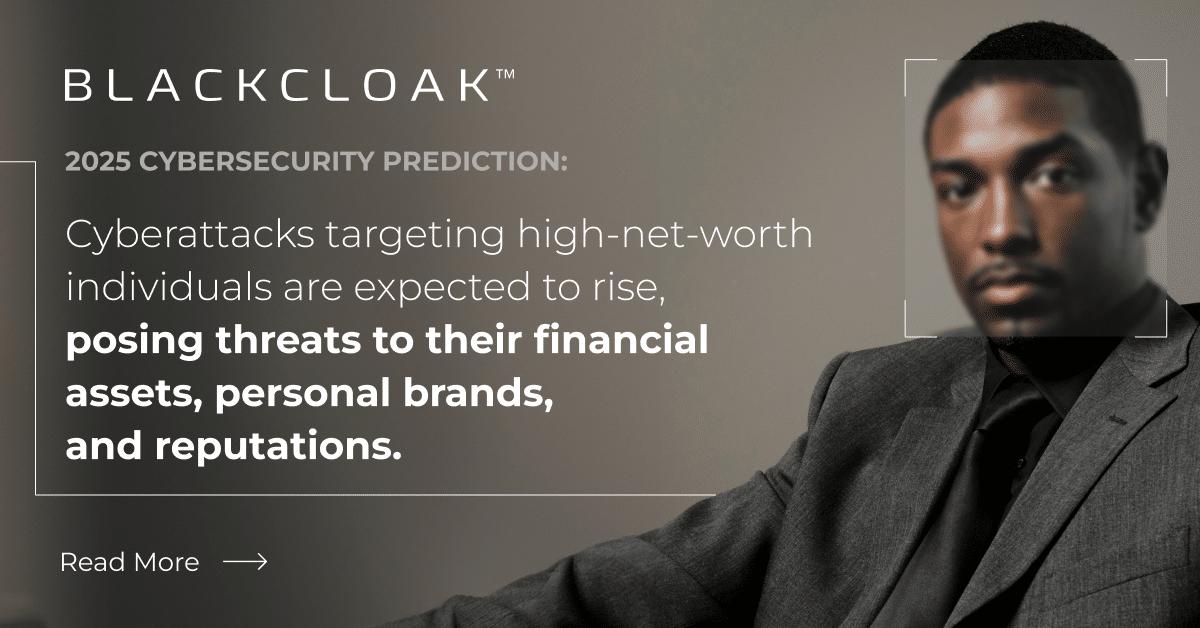2025 Prediction 4: Cyber Attacks Targeting High-Net-Worth Individuals Will Increase, Targeting Not Only Their Financial Lives but also Their Brands And Reputations

On January 7, we published a press release to share our five predictions for cybersecurity in 2025. Over the next few weeks, we’ll publish a blog series that provides additional commentary on each prediction. This is the second blog in the series. Check out the first, second, and third blogs here.
Prediction Key Takeaways:
- The rising tide of cyber attacks against high-net-worth individuals and family offices reflects a simple reality: cybercriminals go where the money is. What makes wealthy individuals particularly vulnerable is a combination of several factors. Their public status often means more personal details are accessible to potential attackers, and their complex financial lives – involving multiple accounts, properties, and business interests – create numerous entry points for cybercriminals.
- In a 2024 Family Office Cybersecurity Report by Deloitte, 43% of surveyed family offices had experienced a cyber attack in the prior two years. Family offices, which manage the wealth of high-net-worth individuals and their families, are custodians of sensitive financial and personal information. This data is extremely valuable on the dark web, where it can be sold or exploited for identity theft, fraud, or other illicit activities.
- Attack sophistication has evolved specifically for this demographic. Cybercriminals employ highly refined techniques targeting family offices and wealthy individuals, often using well-designed and thoroughly researched attacks. These can include specialized forms of phishing known as “whaling” attacks, which are precisely targeted at high-value individuals.
The line between personal and professional digital lives has been shrinking, and this convergence is forcing companies to rethink their security paradigms. Digital risk protection markets are projected to reach $333.44 billion by 2032, reflecting the growing recognition that protecting executives in their personal digital lives is crucial for corporate security.
This isn’t just about safeguarding individuals but protecting the entire corporate ecosystem. When executives use personal devices or home networks, they create potential entry points for attackers targeting corporate assets. Personal devices are more likely to be infected with malware, as users often don’t maintain the same security standards they would with company-owned devices.
Several converging factors drive the transformation of digital executive protection into a corporate mandate. First, remote work and Bring Your Own Device (BYOD) policies have expanded the attack surface. Second, cybersecurity risks now encompass economic and social risks, not just technical vulnerabilities. Finally, the sophistication of targeted attacks against high-level executives has reached unprecedented levels, shifting tactics from verbal threats to actual attacks in the first half of 2024.
As we move forward, organizations that fail to implement comprehensive digital executive protection programs aren’t just gambling with their executives’ personal security – they’re risking their entire operation’s integrity. The message is clear: digital executive protection isn’t an option anymore; it’s a fundamental requirement for corporate survival in our interconnected world.
Organizations neglecting to implement comprehensive digital executive protection programs aren’t just gambling with their executives’ personal security – they’re risking their entire operation’s integrity. The message is clear: digital executive protection isn’t an option anymore; it’s a fundamental requirement for corporate survival in our interconnected world.
Stay tuned for our next prediction!
We also have a webinar coming up on January 23 to discuss our predictions live with industry experts. View now.









